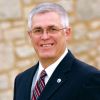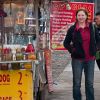Deacon trades street beat for hospital ministry
TORONTO - For nearly 30 years, George Jurenas patrolled the streets of Toronto, keeping people safe. Today, this retired cop patrols the hallways of hospitals, giving people hope.
Jurenas was ordained a deacon in 2008, and has spent most of his time since as a chaplain at Trillium Health Centre in Mississauga and with the Peel Regional Police. And while he said his main inspiration for entering the diaconate was his own parish deacon, he recognizes his years with the Toronto Police Service showed him he had what it takes.
“People would call me Father Confessor,” Jurenas laughed. “(After I arrested people) they’d be sitting in the back of the cruiser and just seemed to open up to me naturally.”
Meeting so many different kinds of people in his profession, Jurenas said, taught him some valuable lessons.
“Over the years, what I found was people aren’t evil,” he said. “No one wants to live on the streets, no one wants to rob a bank, no one wants to put a needle in their arm. There’s usually a reason why they did what they did. There’s a hurt or a pain or something behind that action that for one reason or another placed them there.”
It’s a lesson that has helped him in many situations, like once when he was faced with a patient who, to put it lightly, did not care for his help.
“I introduced myself, said hi, I’m the chaplain, and I basically get, ‘eff off,’ ” Jurenas said.
“I said hey, no problem, God bless you. But you never know. Someone could be in a real bad place… and it’s not that they don’t ever want to talk to you, it’s just at that time.”
Jurenas never gave up on this man, and eventually they were able to turn a corner. But he’s not always so calm and collected, especially working in the palliative care ward. And it is in showing his true emotions that Jurenas sees the biggest difference between his former job and current work.
“I don’t have to pretend to be tough,” Jurenas said. “I can actually cry with people. There is strength as showing your weakness. As an officer, you (have to) play … tough, and there’s a reason for it. If you act mushy people will walk all over you.
“As an officer you’re always standing behind this façade. I’m tough, I’m in control. Then you realize none of us are really in control.”
This hit close to home for Jurenas when he was diagnosed with prostate and bladder cancer himself before becoming a deacon. He underwent an operation and radiation therapy and is now in remission, but he said the experience gave him insight into what people are feeling and going through in hospitals.
“I’ve laid in that bed,” Jurenas said. “No matter what faith you are, we’re all going through the same fears, the same worries and the same pains when we’re lying in that hospital bed.”
Jurenas uses this kind of non-denominational approach to spirituality in his chaplaincy work.
“For me as a Catholic deacon, it’s really neat when I do go visit people from other faiths, whether it be Muslim, Sikh, Hindu, you name it,” Jurenas said.
“We meet together at a certain spiritual, emotional place. Some people say does it weaken your faith? I always tell them if anything, it strengthens my faith. There’s a face of Christ in all of us.”
Jurenas saw this as particularly true when he experienced what he described as a miracle — a man who was told he had months to live walked out of the hospital a year and a half later. Jurenas and the man’s wife, a Muslim woman, had been praying together every week, he with his rosary, she with her amber beads.
“There’s a sense of respect of each other, even though we’re from different faiths and backgrounds,” Jurenas said. “It just shows you when we concentrate on what we have in common, Christ finds a way.”
Jurenas has also found humour in many situations, such as the time he came across a patient and recognized him as a former biker — one whom he had arrested at least half a dozen times in downtown Toronto.
“I used to tell him, you’re not really good at (being a criminal),” Jurenas laughed. “If (I), this beat cop, can arrest you half a dozen times, you should probably look for another line of work!”
Even former arrestees, Jurenas looked to help.
“Here’s a guy, a big feared biker. When he’d walk down the street people would move out of his way,” Jurenas said. “And all of a sudden he’s like a baby, wearing a diaper, can’t really leave the bed. It really affected him emotionally, that self-esteem drop.”
And so Jurenas went out and bought this man Harley Davidson stickers for his wheelchair.
“It was just beautiful to see, he went from this depressed state to laughing and joking,” Jurenas said. “Last thing I heard he’s at a long-term care facility and he’s scooting around.”
But ever humble, this devoted husband and father of four would never take too much credit.
“I’m basically a mirror, and I just show what you have inside of you,” he said. “At the end of the day you have to realize you’re not a superhero, you’re not a saviour. You’re just a very mortal human being.
“You do what do can.”
[issuu width=600 height=360 backgroundColor=%23222222 documentId=120910160538-19846c86f786424e98153821bd480e84 name=diaconate username=catholicregister tag=anniversary unit=px v=2]
Forgiveness can change the world as we know it
TORONTO - Nobody disputes that forgiveness is the right thing to do, or that it might sometimes be difficult. Immaculée Ilibagiza has much more than that to say about forgiveness.
The Rwandan genocide survivor and best-selling author believes forgiveness can be the basis of our society — the foundation for a different kind of politics, a better sort of media, a more purposeful economy, higher ideals in education, stronger families and a new world order.
“It’s about understanding that forgiveness is peace. Peace starts in the heart. It starts in the family. It comes to the country,” Ilibagiza told The Catholic Register.
Ilibagiza will be at the Marylake Our Lady of Grace Shrine in King City, Ont., Sept. 28-29 to tell her story and nudge the audience into a deeper understanding of forgiveness.
Ilibagiza’s story of survival in the midst of the 1994 Rwandan genocide is as raw and inspiring as any. She and seven other women spent 91 days in silence hiding in a bathroom at the church rectory. She began those 91 days as a 52-kliogram (115-pound) 24-year-old surrounded by family everywhere she went. She emerged just 30 kilograms (65 pounds) as one of the last surviving Ilibagizas. Only one brother, who happened to be abroad during the orchestrated massacre of 900,000 Rwandan Tutsi and Hutus judged too friendly with Tutsi, survived.
In the cramped bathroom, Ilibagiza had a Bible, a dictionary and a rosary her father had given her. With the Bible and the dictionary she learned English. With the rosary she deepened her relationship with Mary.
Outside the church yard she confronted a man armed with a machete — the same man who killed her mother and a brother. She said to him, “I forgive you.”
In the aftermath of the genocide, Ilibagiza worked for the United Nations and eventually moved to New York to work at United Nations headquarters. She would quietly tell her story to co-workers and friends, but it wasn’t the sort of story that could stay quiet.
Eventually she wrote Left To Tell: Discovering God Amidst the Rwandan Holocaust. No ordinary venture into religious publishing, Left To Tell became a New York Times best seller, has been translated into 15 languages and has been added to the curriculum for thousands of high school and university students around the globe.
By now, Ilibagiza has told her story hundreds of times. DVDs of her retreat talks sell online and she’s signed a contract with MPower Pictures to transform her story into a feature film. But the 42-year-old mother of two continues to be surprised by the effect her story has on audiences.
“I’m really more amazed by what people take from my story,” she said. “What people take is that forgiveness, in such a magnificent way, is in their hearts.”
Ilibagiza has been confronted with many audience members who, either at the end of her talk or weeks later, discover a capacity to forgive husbands, wives, parents, children, brothers and sisters. But Ilibagiza also emphasizes how personal and intimate acts of forgiveness within families and among friends can begin a process that reaches beyond that immediate circle.
The touchstone of Ilibagiza’s talks is the spirituality of the rosary. She has written a book about the apparition of Our Lady of Kibeho, a recognized Marian apparition from the early 1980s in a small town in Rwanda. The apparition included a vision of men with machetes and a warning about the dire consequences of turning away from God.
The economic and social implications of reconciliation and forgiveness are on display to the world in Rwanda today, Ilibagiza said. The number of universities and university enrollment have skyrocketed since the genocide. The economy is growing at eight per cent yearly and Africa’s most densely populated and deeply divided nation is discovering a new sense of citizenship that transcends ethnic identity, she said.
“People are building now more than ever, because they learned a lesson,” said Ilibagiza. “My reason to forgive is that I finally came to understand that people can change, people can learn, people are smart.”
Ilibagiza has taken her gospel of forgiveness to the Vatican and an audience with Pope Benectict XVI. She met with the Pope at the end of his Angelus address Sept. 4. She found the experience overwhelming.
Tickets to Ilibagiza’s talk at Marylake are $50 for general admission or $100 for reserved seating, a reception with her and a signed copy of Left To Tell. Call (905) 833-5368 or visit www.luvn4gve.ca.
Ontario Catholic trustees not giving up on regaining management rights
TORONTO - Not willing to admit defeat just yet, the Ontario Catholic School Trustees' Association (OCSTA) will continue to push for changes to the Putting Students First Act.
"It is our intention to put forward some ideas and possibly have some input," said OCSTA president Marino Gazzola.
Under the legislation passed Sept. 11, Ontario's Catholic school boards are bound by the agreement the province reached with the Ontario English Catholic Teachers' Association (OECTA) on July 4. That deal means a more restrictive set of rules in hiring rights and management oversight of diagnostic testing, which public boards don't face due to a deal Dalton McGuinty's Liberals had to strike with the Conservatives in order for the legislation to pass.
According to the Ministry of Education, Ontario boards will soon have more information regarding the Policy/Program Memorandum development process and further information about the hiring practice regulation.
"The ministry will begin the consultation process soon for the development of a Policy/Program Memorandum on effective use of diagnostic assessments," said Gary Wheeler, a ministry spokesperson. "In the coming days, the ministry will provide additional information to school boards on the fair and transparent hiring regulation announced in August.
"The regulation is based on the memorandum of understanding signed with OECTA (Ontario English Catholic Teachers' Association)."
"We'll have to see what those specifically say before we can say where we are going with this," said Gazzola.
OCSTA is still very concerned about the two provisions within that deal that will reallocate managerial rights. The association will "put forward some amendments that we had that would help protect the voice of parents and the quality of education in Ontario," said Gazzola. "We thought it would be very important to the legislation (but) obviously those amendments didn't pass so we're very disappointed."
While OCSTA knows what it wants, how it plans to achieve it is still undetermined.
"Right now we are almost in a holding pattern," said Gazzola. "We'll have to sit down and then see what our next steps are going to be."
What does have to be taken care of is the local collective bargaining process for each board, at least what is left of it.
"We remain opposed to the legislation, a legislation that puts Catholic and public boards on inequitable footings and weakens the collective bargaining process for all employees," said Mario Pascucci, chair of the Dufferin-Peel Catholic District School Board. "We will, however, abide by the law and will move forward, seeking to bargain on the remaining local issues."
Although Gazzola encourages the conversation continue between trustees and teachers, he did caution against moving too swiftly.
"Boards are going to have to sit down and look at what they can still work with and talk about," said Gazzola. "I don't think anyone should take any rash actions or quick decisions. They're going to have to sit down and analyse everything and see where they have to go."
Catholic trustee Tobias Enverga elevated to the Senate
TORONTO - For the second time Tobias Enverga has made Canadian political history.
After being the first Filipino-Canadian to hold a publicly elected position in Toronto, the Catholic school trustee has been appointed to the Canadian Senate.
"I'm the first Filipino-Canadian (senator) and we have some unique values that the Senate doesn't have yet and I want to share that," said Enverga, who is now a former Toronto Catholic District School Board trustee after his appointment. "It's a big honour for me and a big honour for our community at the same time."
Prime Minister Stephen Harper's office announced Enverga's election to the Red Chamber on Sept. 7, which fills an Ontario seat vacancy. He, along with four other new senators announced the same day, will officially be sworn in on Sept. 25 in Ottawa.
The five new senators, who have an allegiance to the Conservatives, swells the majority government's chamber representation to 62 in the 105-seat Senate.
When Enverga received the phone call telling him he had been chosen as a senator, he was shocked. Not only did he not know he'd been nominated, Enverga, 56, didn't even really know what a senator did.
"Never in my wildest dreams did I think I was going to be in one of the highest positions in the land," said Enverga. "Like any other new position there will be new challenges. I'm not sure what the new challenges will be because this is the first time that I've heard about the position actually."
But treading unfamiliar waters is nothing new to Enverga, who arrived in Canada in 1981 seeking "adventure and a good job."
Employed by the Bank of Montreal since arriving here, most recently as a project manager, Enverga sought adventure again in 2010 when he ran for Catholic school trustee.
As a senator Enverga had to give his two weeks notice to the bank and resign from his trustee position.
"According to the by-laws I cannot hold two jobs, especially as a senator and trustee," he said.
Although Enverga said he feels bad about leaving the ratepayers who voted for him, this new position will allow him to help a broader range of people. And he believes his experience with the TCDSB can only help him in his new position.
"The good thing is that the Catholic school board has given me the experience to deal with issues and deal with people at the same time," said Enverga, adding that the economy will be a large area of focus while sitting in the Red Chamber. "It's a big challenge but God will not give me anything that I cannot do."
The TCDSB has not decided how it will fill Enverga's seat. It could call a by-election or appoint an interim trustee.
TORONTO - The Interfaith Social Assistance Reform Coalition and the Intercultural Dialogue Institute of Toronto are pulling together Jews, Christians, Muslims and Buddhists to think and talk about social justice at a free dinner at the Church of the Holy Trinity.
The evening will be moderated by Salt + Light TV personality Deacon Pedro Guevara Mann, with opening remarks from Campaign 2000 national co-ordinator Laurel Rothman, and takes place Sept. 13 at 6:30 p.m. The Church of the Holy Trinity is tucked in next to the Eaton Centre in downtown Toronto.
Campaign 2000 is the coalition of churches, unions and social work agencies that campaigns against child poverty in Canada.
Speaking on social justice from the point of view of major faith traditions are Sean Hillman, Buddhist PhD candidate in religion at the University of Toronto, KAIROS executive director Jennifer Henry, Muslim scholar Halil Simsek and Avrum Rosensweig, founding director and president of the Jewish volunteer agency Ve’ahavta.
To register for the evening go to www.interfaithdinner.com. Space is limited.
TORONTO - The long-standing shortage of Catholic foster parents in Toronto isn’t getting any better. The Catholic Children’s Aid Society of Toronto has 297 foster care spots available on its own roster. This year it has had to rely on 412 out-of-town spots it purchases from private contractors.
Out-of-town care costs a lot more and it removes kids from their school, their circle of friends and family — everything that can help maintain their sense of belonging. Trouble is, there aren’t a lot of couples like Nellie and Bernie Desroches left in the city. And it is likely there will be fewer in the future.
Food vendors want justice on the streets of Toronto
TORONTO - Marianne Moroney wants justice on the streets of Toronto — justice that can deliver a simple, cheap, satisfying meal. As executive director of the Toronto Street Food Vendors’ Association, Moroney has been fighting city hall for the rights of Toronto’s hot dog stands.
“City councillors have set out purposely to strangle this industry,” Moroney told The Catholic Register.
Moroney is a tenacious and tireless advocate for the mostly poor, mostly immigrant hot dog sellers of the city. It’s an endless and thankless task, but she derives her inspiration from a deep instinct for communion and her attachment to the Eucharist.








